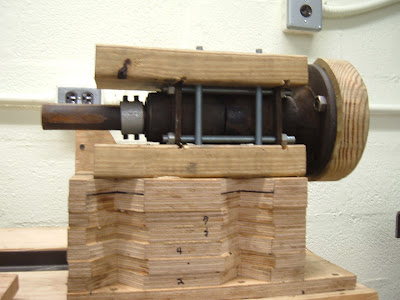
While I was kicking around Philadelphia an old high school classmate, Josh Raizman, contacted me about a human powered project he was working on. He and a team of engineers were designing lathes to be built in Tanzania, the project was part of his engineering studies at Drexel University.
A professor, not in the engineering department, had a connection with Tanzania. He identified that a human powered lathe could be an important tool to help Tanzanian craftsmen develop low-overhead micro-enterprise. This professor enlisted the help of several highly interested engineering students to help him design a lathe.
At one point there was a website dedicated solely to the project, but I believe it has since been taken down. However, Alex Moseson, one of the graduate students working on the team, has reposted all of the information on his own site here.
Their work was very impressive, aside from the challenge of building a human powered lathe, they also had to design it with limited resources in mind. This is one of the greatest challenges of appropriate technology, making something that is highly functional, easily reparable, and made from locally available materials. I think they did a pretty good job with it. I was also impressed by their flexible power supply- one version they built could be run by bike, could be hooked up to a motor, run by treadle, or you could use the spinning wheels of a jacked up car to operate the lathe. This was a higher order of functionality and versatility then anything I had experienced thus far.
I got a chance to visit Josh, and see one of the lathes that was currently under construction in Drexel’s lab. This lathe project was the work of a, mostly, different group of engineering students. Josh said he was really impressed by their work and the improvements they'd made on the designs.
It was a great pleasure to see their work in person, ask lots of questions, and delve into some of the issues surrounding appropriate technology and working abroad.






















No comments:
Post a Comment